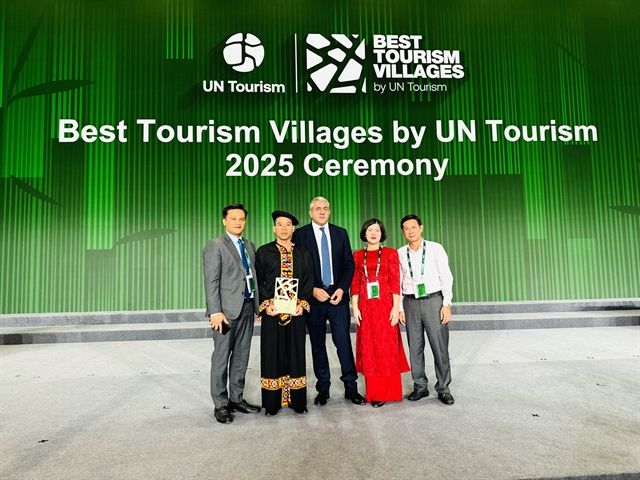Lo Lo Chai of Tuyen Quang province overcome 270 applications from 65 U.N. Tourism Member States to advance to the list of 52 winners from 29 countries of all regions – Africa, the Americas, Asia, Europe and the Middle East.
Another village from Vietnam in the list is Quynh Son Community-based Tourism Village in Lang Son province. Others include Agaete of Spain, Asuka of Japan, Kandelous of Iran, Pont-Croix of France and Yangsuri of the Republic of Korea.
    |
 |
|
Representatives from the Department of Culture, Sports and Tourism of Tuyen Quang Province and residents of Lo Lo Chai Village, Lung Cu Commune, proudly received the title of Best Tourism Village in the World 2025. |
U.N. Tourism Secretary General Zurab Pololikashvili says: “Tourism can be a powerful tool to progress shared prosperity, inclusive growth and territorial cohesion in rural areas.
"Our Best Tourism Villages 2025 highlight communities that are working to safeguard their cultural heritage, preserve their natural resources and create economic opportunities through tourism. These villages show that by embracing tourism, they can promote social inclusion and build a future where no one is left behind.”
The Best Tourism Villages by U.N. Tourism initiative launched in 2021, under the U.N. Tourism for Rural Development Program, accelerates the role of tourism in rural development by valuing and safeguarding rural areas along with their associated landscapes, knowledge systems, biological diversity and cultural heritage.
In recent years, Tuyen Quang has focused on developing Lo Lo Chai in Lung Cu commune into a community-based tourism destination guided by principles of green and sustainable development.
Local authorities have enhanced environmental infrastructure by improving waste collection and treatment systems, reducing single-use plastics, expanding green spaces, and ensuring access to clean water and standard sanitation facilities for visitors.
Numerous initiatives have been carried out to preserve the natural landscape and traditional architecture by using eco-friendly, sustainable materials and carefully managing visitor numbers to maintain ecological balance.
The community’s understanding of tourism has been strengthened through training programs on hospitality skills, service management, food safety and hygiene, fire prevention, environmental protection, and responsible tourism practices.
Local livelihoods have been enhanced through the development of homestay models, traditional cuisine, handicrafts, and cultural and agricultural experiences. These efforts ensure fair benefit sharing, create stable employment opportunities, and encourage active participation from women and youth.
Tuyen Quang has carried out communication and promotional campaigns across multiple platforms, along with tour connection programs, to introduce Lo Lo Chai to the international tourism market and the U.N. Tourism network.
At the same time, the province has gradually established a system to monitor and evaluate sustainable development indicators related to the environment, culture, and socio-economy, enabling policy adjustments that ensure balanced growth between tourism, the community, and nature.
Moving forward, Tuyen Quang plans to replicate the sustainable community tourism model in other localities – a key step in its strategy to make tourism a leading economic sector and to contribute to achieving the province’s sustainable development goals by 2035, with a vision toward 2045.
Tuyen Quang will promote its heritage and cultural values in tourism development by linking Lo Lo Chai with the Dong Van Karst Plateau UNESCO Global Geopark, which was recently recognized by the WTA as “Asia’s Leading Regional Cultural Destination 2025”.
This connection aims to position the province as a sustainable cultural and tourism destination, rich in identity and significance both regionally and globally.
Source: VNA